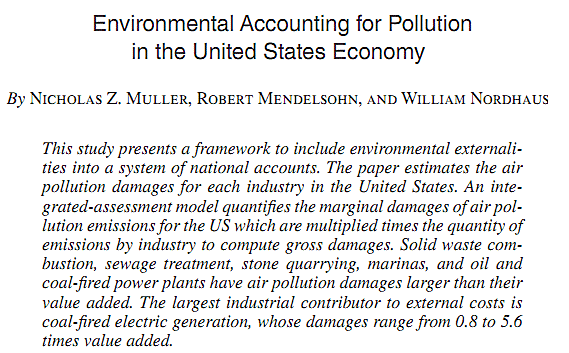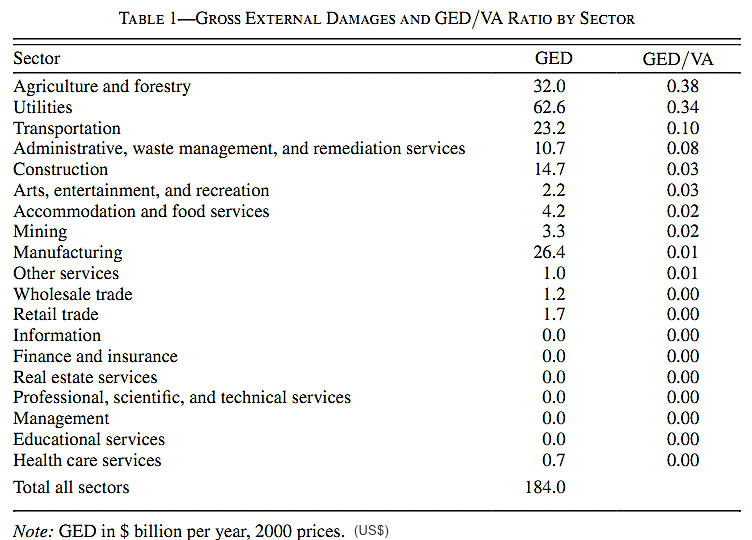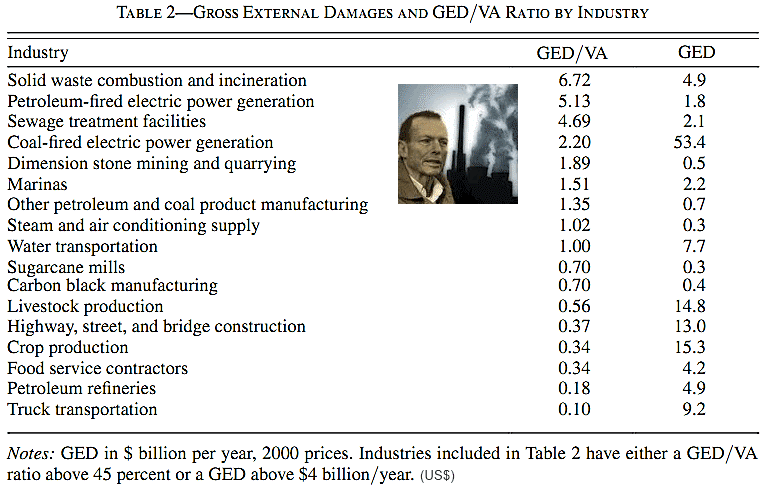
Illustrations by Nature's
An
Environmental,
Economic, Accounting
of
Pollution

Jonathan Burton
|
Opinion- 24 October 2011 |
|
Illustrations by Nature's |
An
Environmental,
Economic, Accounting
of
Pollution |
|

Above is the abstract of a
recent paper![]() published in the American Economic Review
which is an attempt to determine the proportion of the value added to the US
economy compared to gross damage caused by a number of American industries. As
the authors from Middlebury College (Muller) and Yale University (Mendelsohn and
Nordhaus) point out: "An important and enduring issue in environmental economics
[since 1970] has been to develop both appropriate accounting systems and
reliable estimates of environmental damages." While the authors, as
Economics Nobel laureate Paul Krugman points out, "only consider air pollution,
and... make no effort to address longer-term issues such as climate change",
their paper extends previous work by "present[ing] a framework to integrate
external damages into national economic accounts [as well as calculating] the
national damages from air pollution damages by industry for the United
States."
published in the American Economic Review
which is an attempt to determine the proportion of the value added to the US
economy compared to gross damage caused by a number of American industries. As
the authors from Middlebury College (Muller) and Yale University (Mendelsohn and
Nordhaus) point out: "An important and enduring issue in environmental economics
[since 1970] has been to develop both appropriate accounting systems and
reliable estimates of environmental damages." While the authors, as
Economics Nobel laureate Paul Krugman points out, "only consider air pollution,
and... make no effort to address longer-term issues such as climate change",
their paper extends previous work by "present[ing] a framework to integrate
external damages into national economic accounts [as well as calculating] the
national damages from air pollution damages by industry for the United
States."
Their analyses are based on data from 2002 and they develop calculations (in year 2000 dollars) to estimate the "Gross External Damages" (GED, air pollution only) for 19 economic sectors of the US economy and what the ratio of GED to value added (VA) for that nation's economy.

So for example the US utilities sector (principally fossil fuel burning generation of electricity) caused US$62.6 billion of Gross External Damages (as air pollution) which equalled 34% of the value it added to the US economy. And the Table shows that the top six polluters (utilities, agriculture and forestry, manufacturing, transportation, construction and Administrative, waste management, and remediation services) produced US$170 billion of Gross External Damages (92%).
Perhaps the Australian Academy of Science might undertake similar analyses for Australia.
A second set of analyses deals in more detail with industries which either sport GED/VA ratios above 45 percent or yield GED above US$4 billion. Of the 17 industries that qualify nine give GED/VA ratios of 1 or more, i.e. their Gross External Damage based on air pollution alone equals or exceeds the value they add to the economy.
In the case of Solid waste combustion and incineration it's almost 7 times, with Petroleum-fired electric power generation its just over 5 times while Coal-fired electric power generation causes 2.2 times Gross External Damages compared to the value it adds to the economy.
Once again Perhaps the Australian Academy of Science might undertake similar analyses for Australia, and dare we suggest the Prime Minister's Science, Engineering and Innovation Council with the Chief Scientist leading from the front.

Finally, as Professor Krugman writing as an economist notes:
Itís important to be clear about what this means. It does not necessarily say [for example] that we should end the use of coal-generated electricity. What it says, instead, is that consumers are paying much too low a price for coal-generated electricity, because the price they pay does not take account of the very large external costs associated with generation. If consumers did have to pay the full cost, they would use much less electricity from coal ó maybe none, but that would depend on the alternatives.
Alex Reisner
The Funneled Web